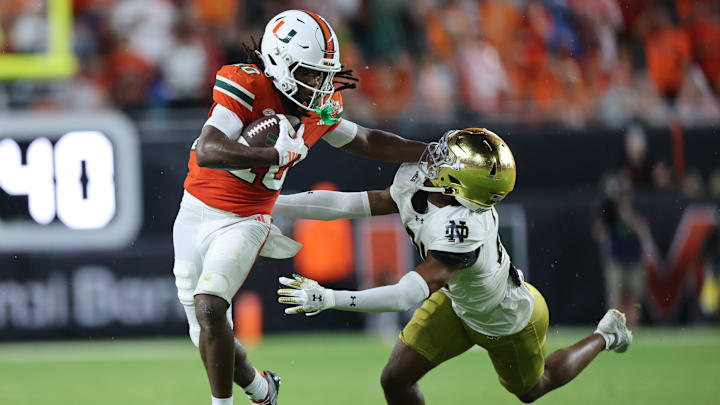If you are a Miami fan staring at this week's College Football Playoff rankings, it is hard not to feel like USC just dodged a bullet by drifting away from Notre Dame. Miami did the thing everyone says you are supposed to do. The Hurricanes scheduled a heavyweight non-conference opponent in Notre Dame, beat the Irish 27-24 in the season opener and built the kind of statement win that usually anchors a playoff resume.
The latest CFP Top 25 heading into Week 14 just dropped 🚨 pic.twitter.com/UP957ZDEkR
— CBS Sports College Football 🏈 (@CBSSportsCFB) November 26, 2025
And yet, in the Week 14 CFP rankings, Notre Dame is No. 9. Miami is No. 12. Same 9-2 record, head-to-head to Miami, three spots of daylight between them. Committee chair Hunter Yurachek has been very clear about why.
On ESPN and in multiple follow-up interviews, he has said the group is comparing the losses when it looks at Notre Dame and Miami. In his explanation this week, he noted that Notre Dame and Miami were in the same comparison pool — alongside Alabama and BYU — but the committee still felt Notre Dame was a complete team and deserves to be at No. 9, with Miami slotted in behind that pod.
CFP committee chair Hunter Yurachek says Notre Dame and Miami were in the same grouping this week and the programs were directly compared.
— Pete Sampson (@PeteSampson_) November 26, 2025
Notre Dame still came out ahead, regardless of the head to head.
In other words, all the games mattered. Not just one of them.
How USC comes into this
That is where the USC piece comes in. The Trojans have been wrestling with the future of their own long-running series with Notre Dame. They quietly removed the 2026 Notre Dame game from their official schedule, prompting a wave of stories asking if the next meeting might be the last in a rivalry that dates to 1926.
USC athletic director Jen Cohen then spelled out how the new playoff math shapes her decisions. In a statement about future non-conference scheduling, she said USC is the only Big Ten team to play a non-conference road game after Week 4 in back-to-back seasons and that "intentionally making our road to the CFP significantly more difficult than our Big Ten peers does not align with our goal to win championships."
Cohen also called non-conference scheduling one of the most important levers USC can pull in pursuit of playoff bids. She wants home games "as early as possible every year," and any future rivalries have to fit that framework.
If you are sitting in an AD chair, what is the rational move?
If you are a different AD, why keep a future trip to Athens or Tuscaloosa on the books? Why risk a neutral-site showcase against a top-10 opponent when the upside is limited and a single sloppy loss can ruin your reputation? The safer play is obvious: get three early home wins against Low Power Four teams, the Group of Six or FCS opponents. Then let your conference schedule carry the strength-of-schedule load and hope you never have to explain bad losses to the committee.
That might be a smart strategy but it is terrible for the sport.
College football is at its best when brands cross over, when Notre Dame flies to Miami in Week 1, when USC and the Irish trade visits in October, when we get measuring-stick games that tell us something real. The current CFP behavior pushes everyone in the opposite direction.
Miami's treatment in these rankings is not just a slight to a team that won on the field. It is a warning for every program still willing to take a big swing in September.
